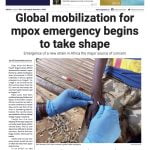As the new Turkish Ambassador in Prague, I am asked more and more frequently about the recent developments in Libya and the policies of the EU and Turkey vis-a-vis this important country.
Unfortunately, the humanitarian situation has worsened in Libya as the effects of terrorism and irregular migration threaten to become more prominent in Africa and the Mediterranean. The situation has been further complicated by the extensive military support to a self-declared warlord named General Khalifa Haftar, who continues to solicit weapons and financial support from various countries with different motives.
The recent Turkish-Russian Joint Statement is a historically important achievement. The diplomatic efforts of these two countries was a huge step forward in the effort to end the military escalation and revitalise the political process in Libya. After intense discussions with the Russians, at the highest level, we declared our common will to bring about an end to the crisis in Libya.
Presidents Putin and Erdogan agreed that there can be no military solution to the conflict and also stressed that a sustainable solution can only be achieved by a Libyan-led and Libyan-owned political process, under UN auspices.
Aligning Russian diplomacy to a statement that highlights the Libyan Political Agreement and UN Security Council Resolution 2259 is an important gain. Our support for the Berlin Process is also reflected in the joint statement. The most important and impressive outcome, however, is the fact that responding to the call of President Erdogan and President Putin, the warring parties then declared their commitment to a ceasefire as of January 12. As a result, the Berlin Summit will be seen as a turning point in the history of Libya.
General Haftar showed his unwillingness to find a political solution by rejecting the ceasefire agreement that was prepared by our country and Russia. On the other hand, we did our part by convincing Libya’s prime minister, Fayez al-Sarraj, to sign the agreement. As a result, now the international community knows which side is willing, ready, and able for a lasting political solution.
All of the necessary measures need to be taken to stabilise the situation on the ground and normalise daily life in Tripoli, as well as in other cities that remain under siege. Turkey will continue her consultations with Russians and other interlocutors to help stabilise the situation, despite the setbacks caused by General Haftar. The international community should pressure the relevant parties to immediately take de-escalatory measures on the ground.
As Hafter’s offensive has intensified, foreign aid continues to flow him. The internationally recognised Government of National Accord requested support from Turkey in its fight against the many threats that target Libya’s integrity and stability — ISIS, Al-Qaida, and other terrorist organisations, as well as illegal armed groups.
Illegal migration and human smuggling from Libya might affect the whole region. Turkey aims to facilitate both a ceasefire and a political solution. We will continue supporting the legitimate government in its fight against terrorism and to prevent another humanitarian crisis and migration wave.
Turkey has no objective to be involved in the domestic clashes of Libya, rather we aim to prevent any development that may drag the region into further instability and lead to additional humanitarian tragedies.
Berlin Process
Since the onset, we tried to explain to all of our counterparts that there can be no military solution in Libya. That is why we are actively contributing to the Berlin Process. As my foreign minister, Mevlut Cavusoglu, said: “We were glad to see Germany taking the initiative to organise such a comprehensive summit. The 55 paragraph-long summit resolution is a good beginning. The efforts of Russia and Turkey played a crucial role towards achieving a ceasefire. Hafter is not an easy or predictable personality, but we are counting on countries who finance him to monitor his actions and prevent any further bloodshed. Without the ceasefire agreement, the Berlin Summit could not have been organised.”
The Berlin Process had no concrete basis to start a constructive dialogue before January 8. Sincere Europeans deserve to be pleased to now have something tangible to work with before the Summit. We are confident that securing a ceasefire and starting a dialogue will facilitate the needed political and economic pillars that will lead to a solution.
The Berlin Process also needs to be more inclusive of Libya’s neighbours. Thanks to our efforts, Algeria is finally invited. Tunisia and Qatar can also make important contributions.
As President Erdogan has very clearly stated: “The road to peace in Libya goes through Turkey. Europe finds itself at a crossroads. And at this historic junction, those working for peace must be courageous and do everything in their power to end the violence. Europe can count on Turkey — an old friend and loyal ally — to achieve that goal.”
That means it is high time for our allies to stop whining and criticising and start supporting Turkey’s peace efforts.
Libya, Turkey and Europe
EPA-EFE//GUIDO BERGMANN
The International Libya Conference in Berlin, January 19, 2020.
- Advertisement -
- Advertisement -






